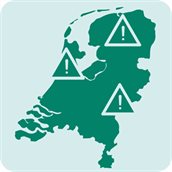Key Dutch climate risks
The Netherlands has long been impacted by physical climate risks. Recent examples include the 400 additional deaths during the 2019 heatwave and over 430 million euros in damage from flooding in Limburg in 2021. A heatwave study (PDF) and flooding study (PDF) by World Weather Attribution show that climate change made both events more likely and more severe.
Today, the country faces increasing challenges due to climate change. The Dutch weather has seen a simultaneous increase in average and extreme temperatures, along with more frequent extreme rainfall and an increase of dry periods. Climate projections by the Royal Netherlands Meteorological Institute (KNMI) (PDF) predict that these changes will continue throughout the coming century. The Dutch Climate Risk Portal aims to highlight both the challenges posed by climate change and the robust adaptation measures the Netherlands is implementing to protect its population, infrastructure, and economy.
Key risks and impacts
In their research, the Netherlands Environmental Assessment Agency (PBL) defines climate risks based on their impact and probability of occurrence. High impact climate risks for the Netherlands include:
- High temperatures, which negatively impact public health, increase medical costs, and reduce labour productivity due to more frequent, intense, and prolonged heat.
- Coastal and fluvial floods, though with a very low probability due to the Dutch flood protection system, can cause extensive damage to lives, the economy, and nature.
- Extreme downpours can cause slight damage to buildings, infrastructure, and agriculture due to flooding.
- Drought can damage building foundations, accelerate pole rot in wooden foundations, and increase the risk of wildfires, with intensified impacts in densely populated areas.
Climate adaptation
For centuries, the Netherlands has successfully managed climate challenges, pioneering in water management and adaptation practices due to its low-lying geography. To manage future climate risks, the Netherlands builds from this expertise in making rapid decisions on how to handle these new or increased climate risks through adaptation. This way, the impacts of physical climate risks now and in the future can be minimised or managed. These adaptation measures are focused on the components of physical climate risk - consisting of exposure, vulnerability and hazard - as is outlined on the Risk assessment guidance page.
In the Netherlands, the key national policies for managing physical climate risks are the National Adaptation Strategy and the Delta Programme. These policies define the measures aimed at making the Netherlands climate-proof and water-robust by 2050.
National Adaptation Strategy
In 2016, the Dutch government published the National Adaptation Strategy (NAS)(PDF) in response to the European Commission's call for all member states to prepare a climate adaptation strategy by 2017. Building on a decade of climate adaptation policy in the Netherlands, the NAS introduces new initiatives while also accelerating and expanding existing ones. To accelerate the implementation of adaptation measures, the National Implementation Programme on Climate Adaptation (NUP KA'23) was published in 2023. This programme outlines the approach for the coming years and identifies additional measures needed to accelerate progress. An updated version of the National Adaptation Strategy is expected in 2026.
Delta Programme
The Delta Programme is a comprehensive plan developed by the Dutch government to keep the Netherlands a safe and resilient delta in the face of climate change. It sets out to protect the Netherlands from flood risk, ensure a reliable fresh water supply, and adapt to the impacts of climate change. The programme was launched in 2010 in response to the growing risks associated with rising sea levels, extreme weather, and changing water management needs. Together with knowledge institutes, companies and civil society organisations, the Dutch government continuously updates the Delta Programme. The Delta Programme Commissioner is the government official responsible for the Delta Programme.

